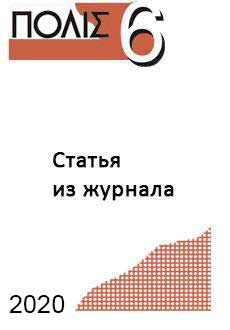Online shop of "Polis. Political Studies" Journal
We in the world, the world in us
Fituni L.L., Abramova I.O. Political Theory of Decolonization: Essentials of Modern Reading. – Polis. Political Studies. 2020. No. 6. P. 26-40. (In Russ.).
Free!
political theory, imperialism, dependence, racism, decolonization, sovereignty, neocolonialism, decoloniality, colonial studies postcolonial studies, post-neocolonialism, quasi-colonialism
The article analyses the evolution and partial rethinking of the political theory of decolonization in the context of the profound changes that have occurred since the adoption in 1960 of the Declaration on the Granting of Independence to Colonial Countries and Peoples by the 15th session of the UN General Assembly, at the initiative of the USSR. With the need for both the ontological and epistemological reassessment of the processes that have evolved and developed over the past 60 years in the current stage of global political relations, in the contexts of uncompleted decolonization and the preservation of elements of coloniality in international relations as a whole globally, but also in many countries of the former colonial periphery domestically, the authors believe this rethinking is thus justified. In this regard, the authors give their critical assessment of the modern research field of decolonization, analyzing the key theoretical doctrines, concepts, and schools of thought – postcolonialism, decoloniality, subalternity, etc. As a result of their critical analysis, it is concluded that in political science, the main focus of modern theoretical works on decolonization has shifted from the previous focus on theoretical issues and the practical agenda of politics, economics, and state building to less tangible areas (information sphere, science, culture, art, language and etc.) or deeply subjective domains (consciousness, selfidentification, representation, memory). Basing on generalizing the practical experience, history, results, and consequences of decolonization, the authors systematize the evolution of coloniality in international relations and the global economy in recent times, the authors offer their own three-element taxonomy of the transformation. They distinguish the following three stages of the development and qualitative metamorphoses of coloniality: a) the version that existed under the condition of the classical colonial domination of European nations at the end of the 19th and the first half of the 20th century; b) the coloniality of neocolonialism, dominant since the middle of the 20th century to the dissolution of the Socialist (Soviet) Block; and c) the current type formed under and by the conditions of globalization. The logical next step towards post-neo-colonialism is the challenge of a new decolonization, whose basic goals would be a multiplicity of development options, the inviolability and preservation of the existing systems of values, freedom of the choice in selecting paths, and models of development, cultures, science, and language.
 English
English Русский
Русский

Reviews
There are no reviews yet.